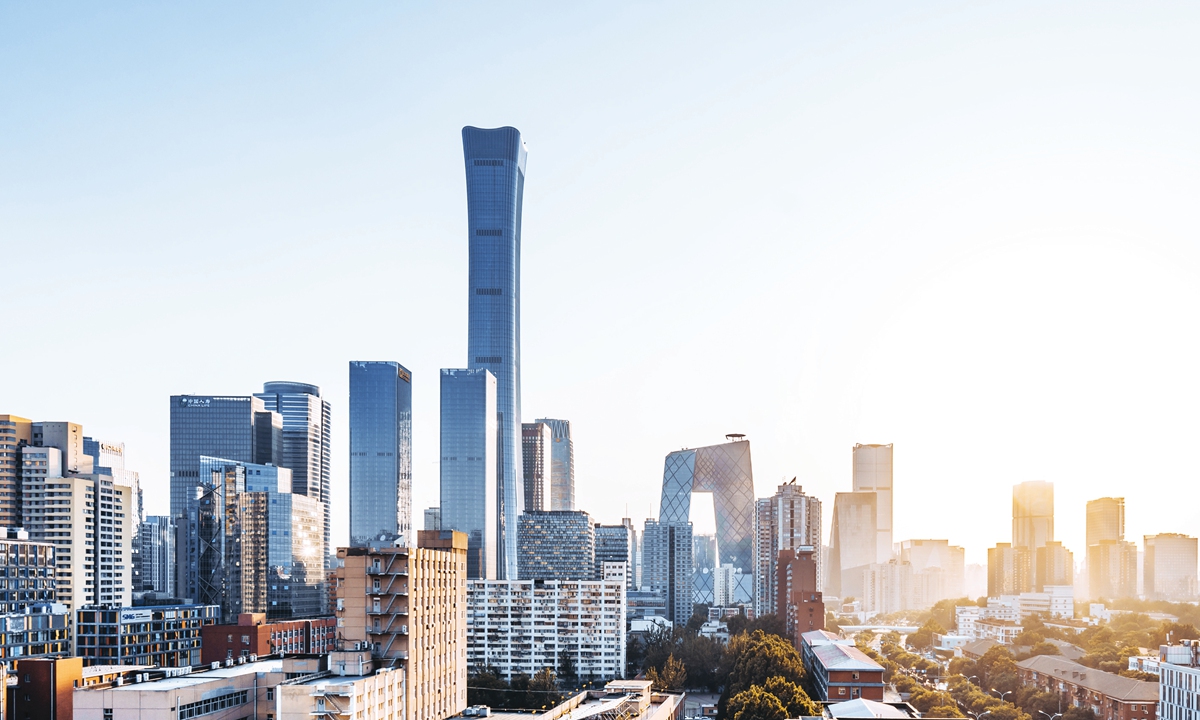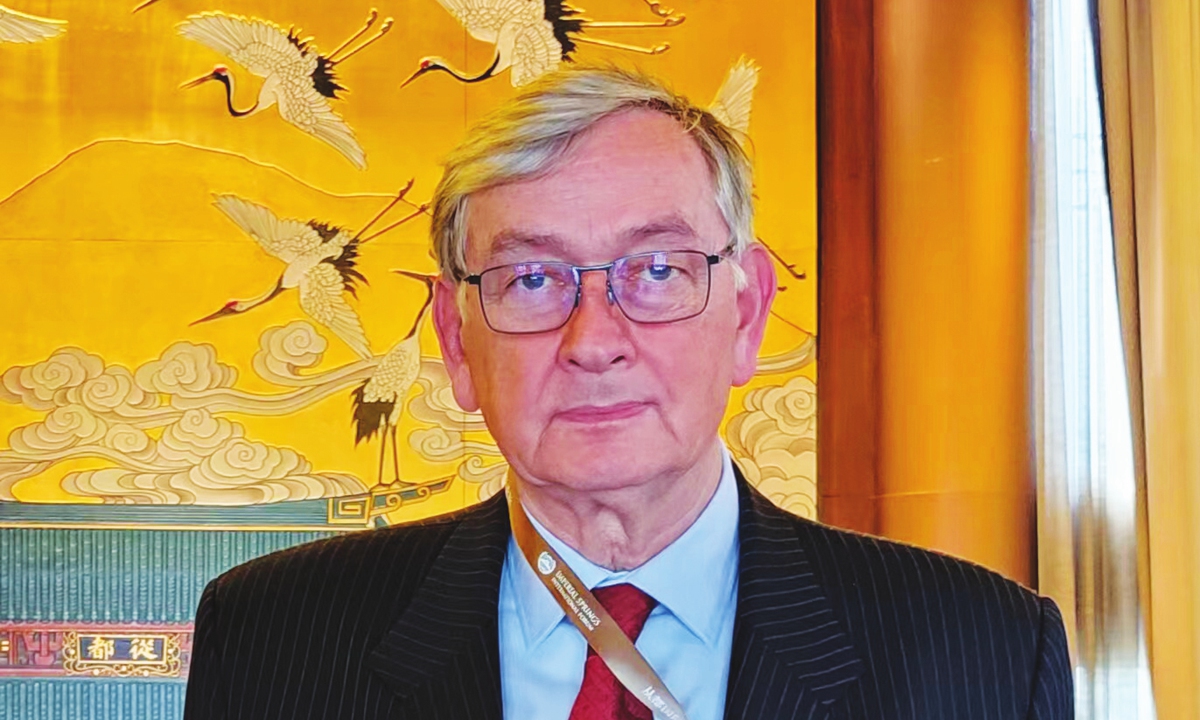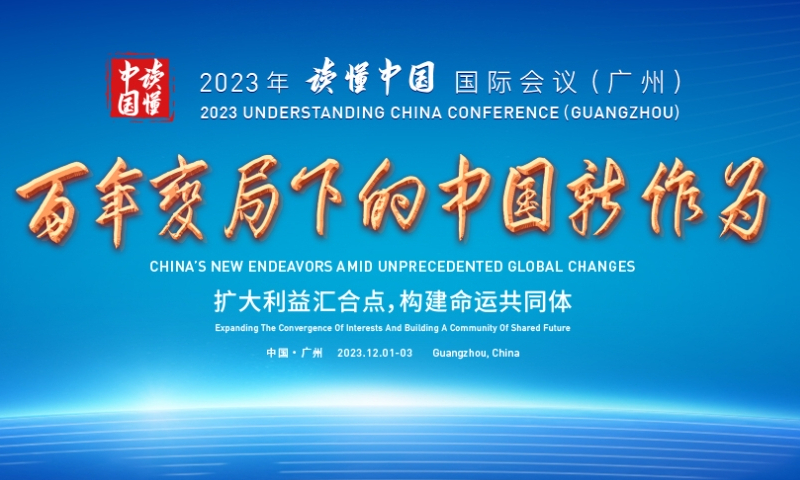2023 Yearender: China's diplomacy sees proactivity, success in 2023: former Slovenian president

A view of Beijing Photo: VCG
Editor's Note:
In 2023, the world continues to witness significant changes and turbulence. As we approach 2024, we conducted in-depth interviews with leading strategists from various countries and regions to gather their perspectives on the prominent global issues of 2023 and China's role in addressing them.
In the first piece of the series, Danilo Türk (Türk), former president of Slovenia and President of World Leadership Alliance-Club de Madrid, shared his thoughts on topics including China's major diplomatic achievements in 2023 and China-European Union (EU) relations with Global Times (GT) reporter Xia Wenxin at the recent 2023 Imperial Springs International Forum in Guangzhou, capital of South China's Guangdong Province.
GT: Looking back at 2023, what diplomatic achievements of China have impressed you the most?
Türk: This year was very active for China. It started with a paper stating its position on the political settlement of the Ukraine crisis in February, which was a very good and valuable document. We have to understand that in the West, this paper was criticized for not being sufficiently specific, but there is something that the critics didn't understand. That was not meant to be a peace plan, but a conceptual framework within which a proper peace plan can be developed gradually.
And then China [this year] was active on the Middle East issue. For example, it helped to bring together an important movement in March between Iran and Saudi Arabia. In June, while receiving the visiting Palestinian president, Chinese President Xi Jinping reemphasized the principle of the two-state solution, something that people didn't really notice at the time, but something that has subsequently become quite central.
Now, when one talks about Gaza, one has to know that the political solution is the only solution that is necessary. Everything else is just temporary. The solution would require a full state of sovereignty for Palestine as well as full membership in the United Nations (UN). In the meantime, we have seen that during China's presidency in November, the UN Security Council first enabled the adoption of a resolution on Gaza. It was not a very strong resolution, but still, it was the first step.
So, if we look at the year 2023, we can see that China was not only very active, but also very successful. Many things are not yet final, but in diplomacy, you don't come to the finality with haste. Being persistent is key, and I believe that the avenues that China opened are healthy and will lead to success.
GT: What event do you predict to be a "black swan" or "grey rhino" in 2024?
Türk: Wars are never inevitable. Wars happen because people decide to go to war. I think that 2023 was also a very stark reminder that wars are something terrible and should be avoided. I wouldn't want to see any "black swans," and I don't think that "black swans" will be seen in 2024.
Our fingers are crossed, but we also need to be active in moving toward that direction. I believe that there will be a lot of work necessary now to deal with Ukraine and the Middle East and that the meetings that President Xi had with President Biden in Bali last year and in San Francisco this year, have created a sufficiently strong base of confidence that the bilateral relations between the two superpowers will be stable. And that would also bring stability to Asia.

Danilo Türk Photo: Xia Wenxin/GT
GT: How have the three global initiatives proposed by China - namely the Global Development Initiative, Global Security Initiative and Global Civilization Initiative - contributed to global governance?
Türk: I think that these three initiatives are very helpful because they laid out a kind of a general platform that was conducive. The Foreign Ministry of China published a document on global governance based on these three initiatives in September 2023, which is a very precise and very sophisticated diplomatic document. I see that this was done by very competent people who know exactly how to translate President Xi's general idea and direction into specific proposals for the international partners and the UN. The UN will hold the Summit of the Future in September 2024, and the Chinese paper published in September is something that can really help a lot. And I think it would be good to revisit and reaffirm the basic ideas of the three initiatives regularly.
GT: China and the EU just held a bilateral summit in Beijing last week. How do you view the current development of China-EU relations?
Türk: I think that China-EU relations require the utmost attention and very serious consideration. There are certain elements of that relationship which will have to be dealt with in a very practical sense, for example, the balance of trade. China exports much more than it imports, and that's not necessarily China's fault, but it is in the interest of both sides to have a reasonable degree of balance.
The other thing would be the measures that constitute further reform and opening-up in China. Some of us who are traveling in China these days see very interesting things happening. For example, President Xi recently spoke about improving legal services and the protection of intellectual property, which are very important issues for investors. So the second question would be: How much progress has been made to improve the investment climate in China and Europe? These are the kinds of things which will have to be addressed.
And then there are political issues. And here I would hope that the EU will understand the role of China today. China can be a very helpful partner to the EU, and together, they could do many good things. Over the past few years, this realization did not get enough understanding in the EU. There was a time in not distant history when the two sides really worked very closely and on very specific projects. We don't have that now.
I think it would help if Europe would come closer to China on the issue of the Middle East. For example, if China and the EU coordinate their moves and diplomatic activities with regard to the Palestinian question, that would be a major contribution. On Ukraine, I don't think that much new is needed, because China is already participating in this collective effort to figure out the way toward peace, and I don't see much space for immediate innovation. But I think now, one of the political things would be: Can China and the EU work more closely together for peace in the Middle East? That would be interesting.
GT: What is the significance of the stability of China-EU relations for both sides and the world?
Türk: I think it's vital for all these three parties because the EU should understand that China is a factor of stability in the world and one has to proceed from that perspective. China has no need to destabilize anything or anybody and the EU should recognize and respect this fact. Therefore, I think the objective conditions for partnership exist, but they are not always articulated in terms of actual political positions. That's still something that requires further work on both sides.
There has to be more dialogue. But ideally, the level of understanding should progress to the point at which each side understands that the other side is a factor of global stability. And therefore, they have to work together to improve global stability. This is not too general. This is actually a very pressing need today.
GT: What lies in the EU's future cooperation with China?
Türk: I think that the EU is a project in the making. The EU was not established as a political entity, it was established as a customs union - in other words, as an economic project. Bringing into that project certain political priorities, some of which are fundamental and serious, is not an easy job. The EU has difficulties in developing a common position on many things. It does not have political processes sufficiently well-designed to be able to produce really adequate responses at any time. This must be understood and appreciated.
I think that the level of policy-making in the EU should be improved and China can help as a valuable partner in many places. For example, both China and the EU have vast interests in strengthening the UN. If there was a very serious joint conference based on the Chinese paper on global governance from September this year, it could help both sides to develop their policies to a point of a proposal that can really make the Pact for the Future meaningful next year.


